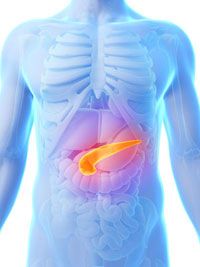Abdominal Radiation May Increase Diabetes Risk in Childhood Cancer Survivors
Previous studies have linked radiation to the pancreas during childhood to an increased risk of type 1 or 2 diabetes, and in a recent small study, researchers investigated the mechanisms leading to abnormal glucose and insulin dynamics in survivors of childhood cancers.
pancreas

Previous studies have linked radiation to the pancreas during childhood to an increased risk of type 1 or 2 diabetes, and in a recent small study, researchers investigated the mechanisms leading to abnormal glucose and insulin dynamics in survivors of childhood cancers.
Interim results of the pilot study of 26 individuals were presented by Danielle Novetsky Friedman, a general pediatrician in the Pediatric Long-Term Follow-Up Program at Memorial Sloan Kettering Cancer Center (MSK), at the 2016 Cancer Survivorship Symposium held in San Francisco.
“I think people are interested in diabetes in general, not just cancer survivors, because it has become an epidemic in the U.S. and really, worldwide,” Friedman said. “We’re taking something that’s pretty common in the general population and because of the therapies we’re giving, we are potentially increasing the risk of that issue.”
The study was conducted exclusively at MSK and aims to enroll about 50 individuals in total, Friedman said. Survivors were eligible if they were diagnosed with childhood cancer before age 21 and were at least two years from completion of therapy. Individuals also were required to be treated with abdominal radiation at MSK and to have records of diagnosis and treatment.
Survivors were excluded who had a known diagnosis of diabetes and/or previous radiation treatment to the brain.
The primary diagnoses were neuroblastoma (20 individuals), embryonal rhabdomysosarcoma (3), Wilms’ tumor, rhabdoid tumor and Hodgkin lymphoma (one of each). Twenty-three patients were normal or underweight and 20 patients had normal waist-to-height ratio.
Median age at abdominal radiation was 3.3 years, while median age at study and median follow-up since radiation were 14.1 years and 10.4 years, respectively. The population was evenly balanced between men (14) and women (12). Nearly all survivors — 24 in total — received a maximum of 20 to 29.9 Gy of radiation to the pancreas.
Study participants underwent a two-hour glucose tolerance test after an overnight fast. Hemoglobin A1c and autoantibodies associated with Type 1 diabetes were assessed. Individuals’ height, weight and waist circumference were measured.
Among the 26 individuals, nine had evidence of abnormal glucose or insulin homeostasis. None of the nine patients had overt diabetes, positive autoantibodies or abnormal hemoglobin A1c.
Of those nine participants, six had evidence of abnormal glucose homeostasis — four had impaired glucose tolerance and two had impaired fasting glucose.
Also among those nine individuals, seven had evidence of abnormal insulin homeostasis — four had reduced insulin sensitivity and three had a defect in insulin secretion.
The “hypothesis-generating” study, as Friedman referred to it, is laying the groundwork for the next steps and is not meant to be definitive. Those next steps, Friedman said, will hopefully include a longitudinal study of more patients at more institutions.
“This is signaling to us that there is something going on already at a young age in participants who are otherwise nonobese and otherwise healthy, which is showing us that we have to think about this issue a little bit more closely in young survivors of childhood cancer treated with abdominal radiation,” Friedman said.


